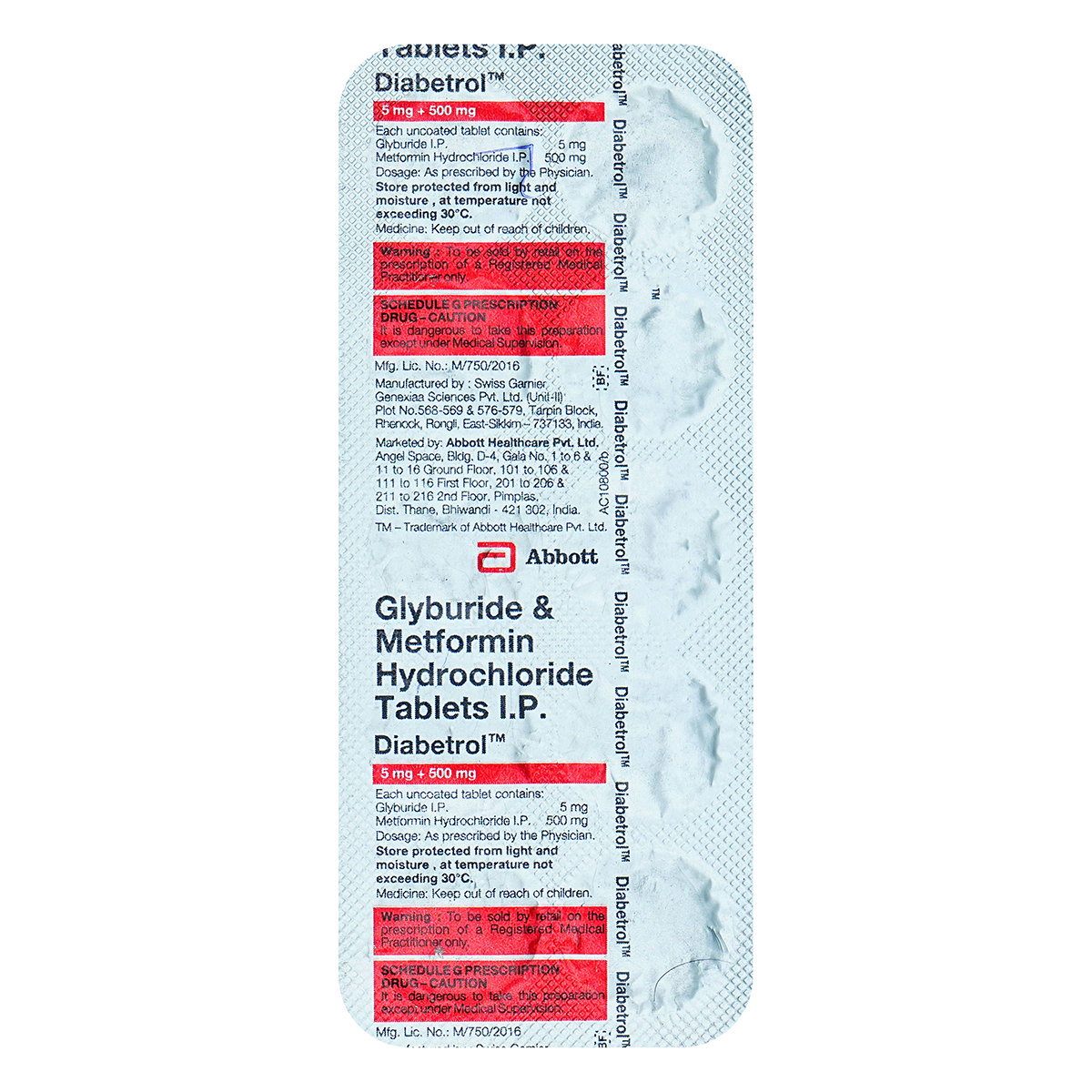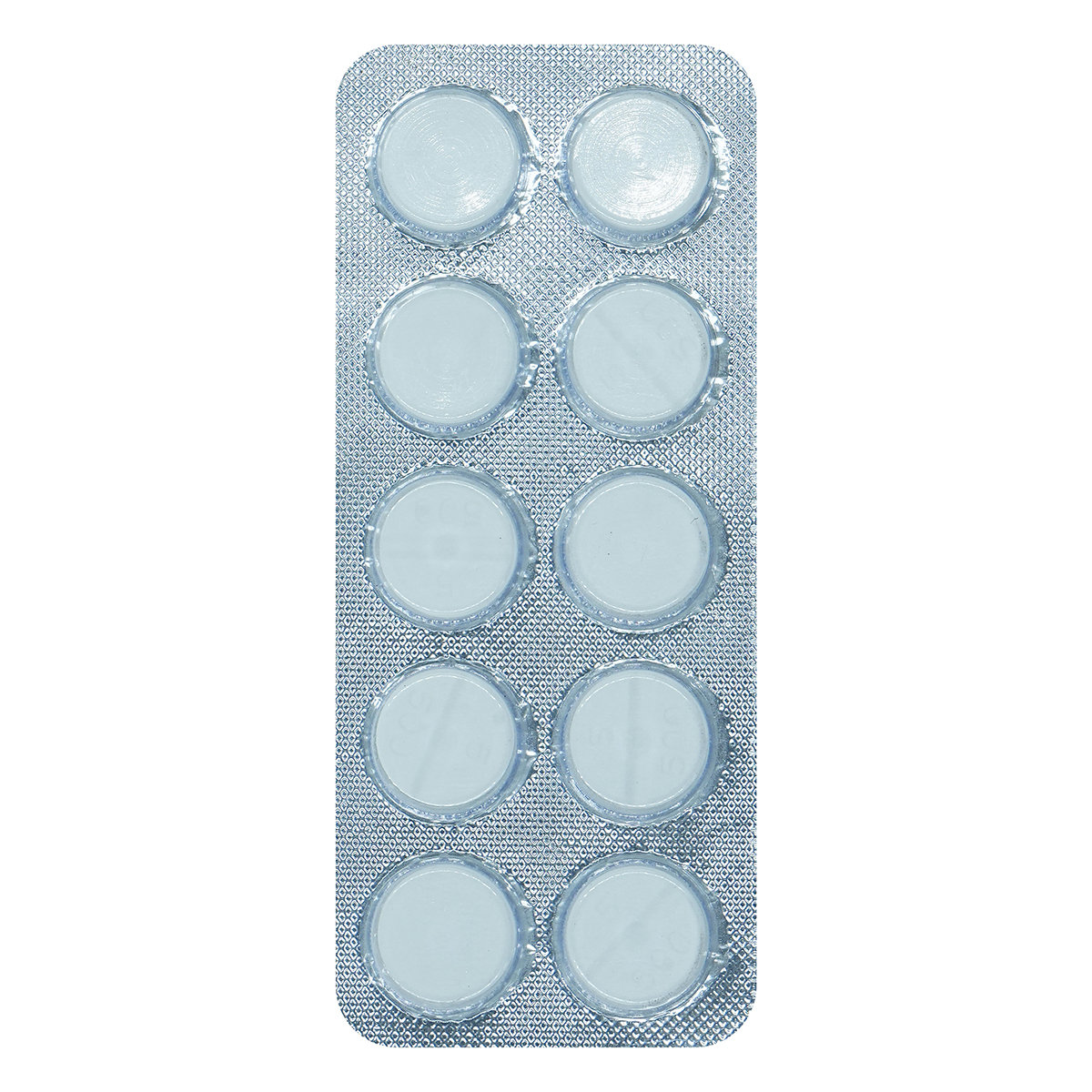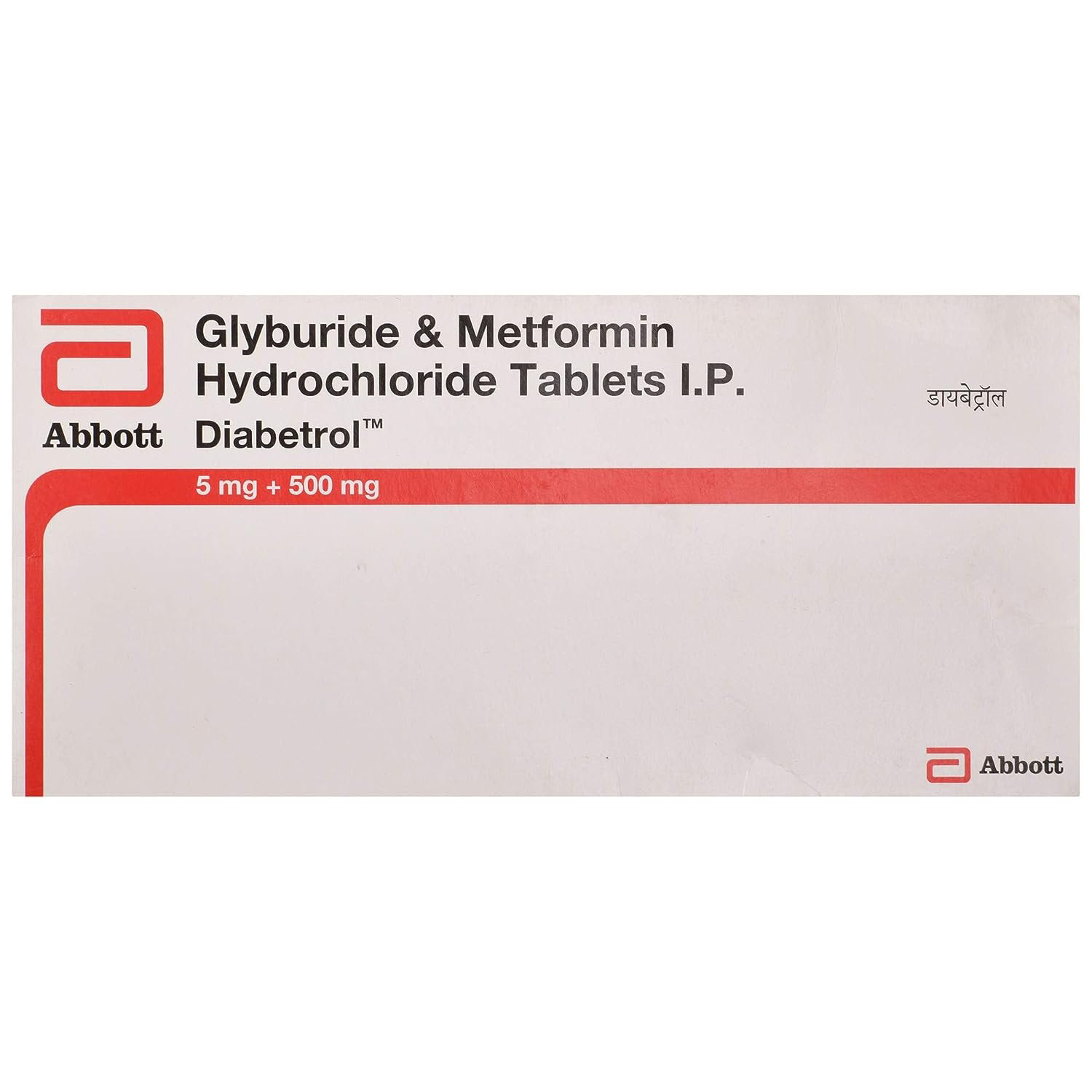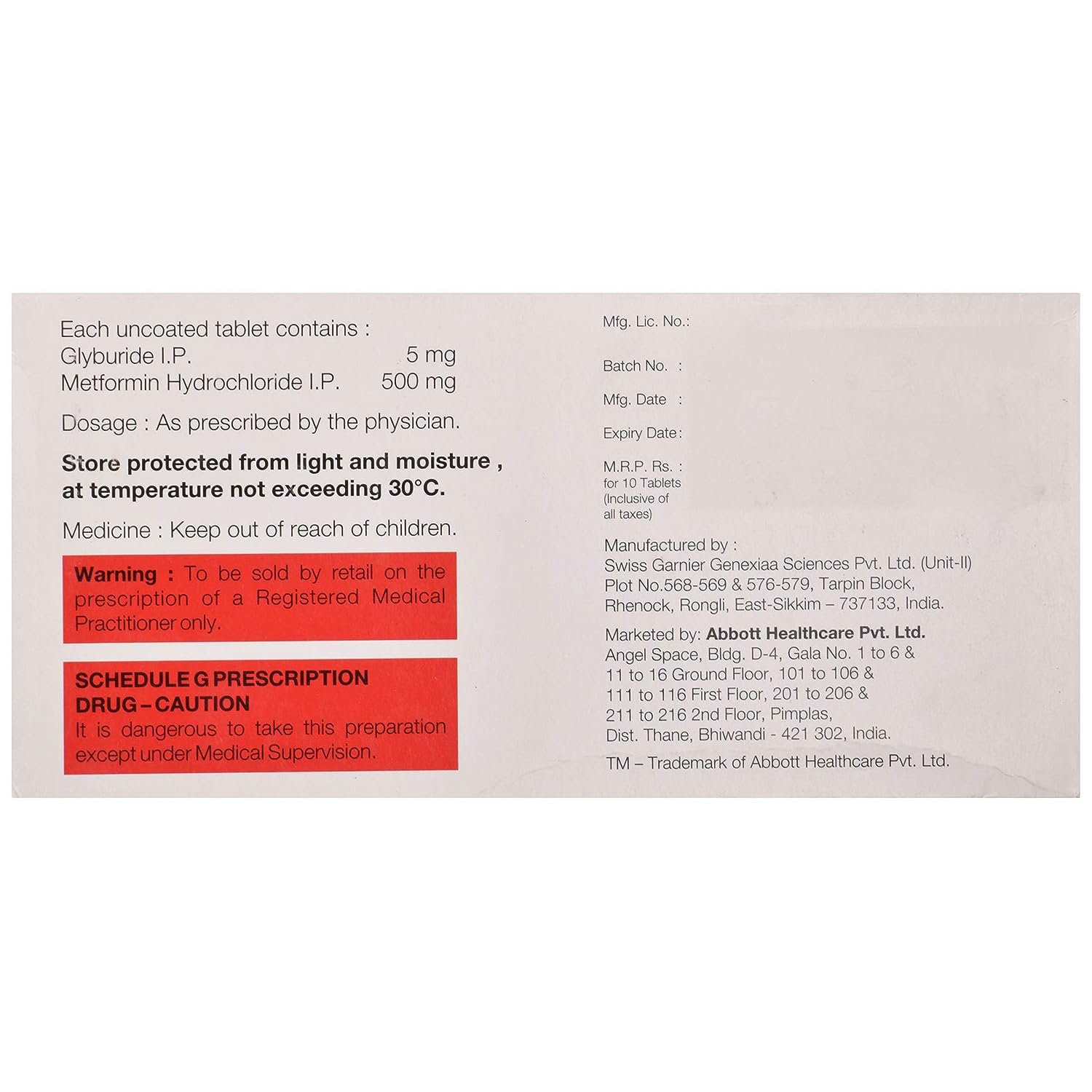Diabetrol Tablet 10's
MRP ₹60
(Inclusive of all Taxes)
₹9.0 Cashback (15%)
Provide Delivery Location
Online payment accepted
 Prescription drug
Prescription drugWhats That
Composition :
Manufacturer/Marketer :
Consume Type :
Expires on or after :
Return Policy :
About Diabetrol Tablet
Diabetrol Tablet belongs to a class of anti-diabetic drugs used in treating type 2 diabetes, especially in patients whose blood sugar levels are not controlled by diet and exercise alone. Type 2 diabetes is a chronic (long-lasting) condition affecting how the body processes glucose. People with type 2 diabetes either do not produce enough insulin, or the insulin produced cannot perform its function in the body (insulin resistance).
Diabetrol Tablet is a combination of two anti-diabetic drugs: Glyburide and Metformin. Glyburide works by stimulating beta cells in the pancreas that produce insulin. Thus, insulin helps to remove sugar from the blood. Metformin reduces sugar production by cells in the liver and delays sugar absorption from the intestines. Also, it increases the sensitivity of muscle cells to insulin which enables these cells to remove sugar more effectively from the blood. Together, Diabetrol Tablet helps treat type 2 diabetes.
Take Diabetrol Tablet as prescribed by your doctor. You are advised to take Diabetrol Tablet for as long as your doctor has prescribed it based on your medical condition. You may sometimes experience low blood sugar, nausea, diarrhoea, upset stomach and headache. Most of these side effects of Diabetrol Tablet do not require medical attention and gradually resolve over time. However, if the side effects persist or worsen, please consult your doctor.
Please inform your doctor if you are allergic to Diabetrol Tablet or other medicines. Diabetrol Tablet is not recommended for children. Avoid breastfeeding while taking Diabetrol Tablet as it may be excreted in human milk. Please inform your doctor before taking Diabetrol Tablet if you are pregnant or planning pregnancy. Avoid alcohol consumption with Diabetrol Tablet as it may increase the risk of lactic acidosis (accumulation of lactic acid in the body). Drive only if you are alert after taking Diabetrol Tablet , as it may cause dizziness. Take short, frequent meals and avoid prolonged fasting while taking Diabetrol Tablet .
Uses of Diabetrol Tablet
Directions for Use
Key Benefits
Diabetrol Tablet is a combination of two antidiabetic drugs: Glyburide and Metformin. Diabetrol Tablet plays a vital role in decreasing the blood sugar level in the body. Metformin lowers glucose production in the liver, whereas Glyburide increases the insulin released by the pancreas. Diabetrol Tablet also helps to prevent serious complications of diabetes, such as kidney damage (diabetic nephropathy), blindness (diabetic retinopathy), and loss of sensation in hands and feet (diabetic neuropathy). Being a combination of two drugs Diabetrol Tablet reduces the need to take multiple pills, making it easier to remember to take medicine.
Storage
- Inform Your Doctor: Notify your doctor immediately about your diarrhoea symptoms. This allows them to adjust your medication or provide guidance on managing side effects.
- Stay Hydrated: Drink plenty of fluids to replace lost water and electrolytes. Choose water, clear broth, and electrolyte-rich drinks. Avoid carbonated or caffeinated beverages to effectively rehydrate your body.
- Follow a Bland Diet: Eat easy-to-digest foods to help firm up your stool and settle your stomach. Try incorporating bananas, rice, applesauce, toast, plain crackers, and boiled vegetables into your diet.
- Avoid Trigger Foods: Steer clear of foods that can worsen diarrhoea, such as spicy, fatty, or greasy foods, high-fibre foods, and dairy products (especially if you're lactose intolerant).
- Practice Good Hygiene: Maintain good hygiene to prevent the spread of infection. To stay healthy, wash your hands frequently, clean and disinfect surfaces regularly, and avoid exchanging personal belongings with others.
- Take Anti-Diarrheal Medications: If your doctor advises, anti-diarrheal medications such as loperamide might help manage diarrhoea symptoms. Always follow your doctor's directions.
- Keep track of your diarrhoea symptoms. If they don't get better or worse or are accompanied by severe stomach pain, blood, or dehydration signs (like extreme thirst or dark urine), seek medical help.
- Hydrate your body: Drink enough water to prevent dehydration and headaches.
- Calm Your Mind: Deep breathing and meditation can help you relax and relieve stress.
- Rest and Recharge: Sleep for 7-8 hours to reduce headache triggers.
- Take rest: lie down in a quiet, dark environment.
- Cold or warm compresses can help reduce tension.
- Stay Upright: Maintain good posture to keep symptoms from getting worse.
- To treat headaches naturally, try acupuncture or massage therapy.
- Over-the-counter pain relievers include acetaminophen and ibuprofen.
- Prescription Assistance: Speak with your doctor about more substantial drug alternatives.
- Severe Headaches: Seek emergency medical assistance for sudden, severe headaches.
- Frequent Headaches: If you get reoccurring headaches, consult your doctor.
- Headaches with Symptoms: Seek medical attention if your headaches include fever, disorientation, or weakness.
- Inform your doctor about the nausea and discuss possible alternatives to the medication or adjustments to the dosage.
- Divide your daily food intake into smaller, more frequent meals to reduce nausea.
- Opt for bland, easily digestible foods like crackers, toast, plain rice, bananas, and applesauce.
- Avoid certain foods that can trigger nausea, such as fatty, greasy, spicy, and smelly foods.
- Drink plenty of fluids, such as water, clear broth, or electrolyte-rich beverages like coconut water or sports drinks.
- Use ginger (tea, ale, or candies) to help relieve nausea.
- Get adequate rest and also avoid strenuous activities that can worsen nausea.
- Talk to your doctor about taking anti-nausea medication if your nausea is severe.
- Record when your nausea occurs, what triggers it, and what provides relief to help you identify patterns and manage your symptoms more effectively.
- Drink water or other clear fluids.
- To prevent worsening of pain, limit intake of tea, coffee, or alcohol.
- Include bland foods like rice, toast, crackers, and rice in your diet.
- Avoid lying down immediately after eating as it may cause indigestion or heartburn.
- Avoid acidic and spicy food as it may cause indigestion.
- Inform your doctor about dizziness symptoms. They may adjust your medication regimen or prescribe additional medications to manage symptoms.
- Follow your doctor's instructions for taking medication, and take it at the same time every day to minimize dizziness.
- When standing up, do so slowly and carefully to avoid sudden dizziness.
- Avoid making sudden movements, such as turning or bending quickly, which can exacerbate dizziness.
- Drink plenty of water throughout the day to stay hydrated and help alleviate dizziness symptoms.
- If you're feeling dizzy, sit or lie down and rest until the dizziness passes.
- Track when dizziness occurs and any factors that may trigger it, and share this information with your doctor to help manage symptoms.
- If you experience low blood sugar levels, inform your doctor. They will assess the severity and make recommendations for the next actions.
- Your doctor will assess your symptoms, blood sugar levels, and overall health before recommending the best course of action, which may include treatment, lifestyle modifications, or prescription adjustments.
- Follow your doctor's instructions carefully to manage the episode and adjust your treatment plan.
- Make medication adjustments as recommended by your doctor to prevent future episodes.
- Implement diet and lifestyle modifications as your doctor advises to manage low blood sugar levels.
- Monitor your blood sugar levels closely for patterns and changes.
- Track your progress by recording your blood sugar levels, food intake, and physical activity.
- Seek further guidance from your doctor if symptoms persist or worsen so that your treatment plan can be revised.
Drug Warnings
Some diabetic patients taking Diabetrol Tablet may develop a rare but serious condition called lactic acidosis. In this condition, there is too much lactic acid accumulated in the blood. Inform your doctor if you have/had kidney disease, diabetic ketoacidosis, heart attack, stroke, heart, liver problems or if you are older than 65years. If you are allergic to Diabetrol Tablet or any other medicines, please tell your doctor. Diabetrol Tablet is not recommended for children. Avoid breastfeeding while taking Diabetrol Tablet as it may be excreted in human milk. If you are pregnant or planning for pregnancy, please inform your doctor before taking Diabetrol Tablet . Avoid alcohol consumption with Diabetrol Tablet as it may increase the risk of lactic acidosis (accumulation of lactic acid in the body). Drive only if you are alert after taking Diabetrol Tablet as it may cause dizziness.
Drug-Drug Interactions
Drug-Drug Interactions
Login/Sign Up
Co-administration of Diabetrol Tablet with Metrizamide together can cause the risk of lactic acidosis (when the body produces too much lactic acid ).
How to manage the interaction:
Taking Diabetrol Tablet with Metrizamide is generally avoided as it can possibly result in an interaction, it can be taken if a doctor has advised it. However, if you experience headaches, muscle cramps or pain, contact a doctor immediately. Do not discontinue any medications without consulting a doctor.
Co-administration of Iofendylate with Diabetrol Tablet can increase the risk of side effects.
How to manage the interaction:
Taking Diabetrol Tablet with Iofendylate is generally avoided as it can result in an interaction, please consult your doctor before taking it.
Co-administration of Iohexol with Diabetrol Tablet can increase the risk of side effects.
How to manage the interaction:
Taking Diabetrol Tablet with Iohexol is generally avoided as it can result in an interaction, please consult your doctor before taking it.
Co-administration of Iopromide with Diabetrol Tablet can increase the risk of lactic acidosis.
How to manage the interaction:
Taking Iopromide with Diabetrol Tablet is not recommended, please consult a doctor before taking it. Do not discontinue the medication without consulting a doctor.
Co-administration of Iomeprol with Diabetrol Tablet can increase the risk of side effects.
How to manage the interaction:
Taking Diabetrol Tablet with Iomeprol is not recommended, please consult a doctor before taking it. Do not discontinue the medications without consulting a doctor.
Co-administration of Iopamidol with Diabetrol Tablet can increase the risk of side effects.
How to manage the interaction:
Taking Diabetrol Tablet with Iopamidol is not recommended, please consult a doctor before taking it. Do not discontinue the medications without consulting a doctor.
Co-administration of Ioglicic acid with Diabetrol Tablet can increase the risk of side effects.
How to manage the interaction:
Taking Diabetrol Tablet with Ioglicic acid is generally avoided as it can result in an interaction, please consult your doctor before taking it.
Co-administration of Iodixanol with Diabetrol Tablet can increase the risk of side effects.
How to manage the interaction:
Taking Diabetrol Tablet with Iodixanol is not recommended, please consult a doctor before taking it. Do not discontinue the medications without consulting a doctor.
Co-administration of Ioglycamic acid with Diabetrol Tablet can increase the risk of side effects.
How to manage the interaction:
Taking Diabetrol Tablet with Ioglycamic acid is generally avoided as it can result in an interaction, please consult your doctor before taking it.
Co-administration of Diabetrol Tablet and Iobitridol can increase the risk of lactic acidosis (when the body produces too much lactic acid).
How to manage the interaction:
Taking Diabetrol Tablet with Iobitridol is generally avoided as it can result in an interaction. Please consult your doctor before taking it.
Drug-Food Interactions
Drug-Food Interactions
Login/Sign Up
Diet & Lifestyle Advise
- Eat at regular intervals. Do not take a long gap between meals or snacks.
- Monitor your blood sugar level regularly especially when there are a lot of fluctuations.
- Invest at least 150 min of moderate-intensity physical activity and 15 minutes of high-intensity exercise every week.
- Lose weight gradually to achieve a healthy body mass index (18.5 to 24.9).
- Replace refined carbohydrates containing foods with whole grain foods and increase intake of fruits and veggies and other fibre enriched foods.
- Reduce intake of saturated fat (or hidden fats) in food like chips, crisps, pastries, biscuits and samosas. Choose omega 3 fatty acid-containing oils for daily cooking. For frying, you may use palm oil, mustard oil, groundnut oil, rice bran oil, and safflower oil.
- Do not take stress as it may elevate your blood sugar level. You may adopt stress management techniques like mindfulness, yoga or meditation to control stress-related blood sugar changes.
- Opt for low-fat dairy products (low-fat yoghurt, fat-free milk and cheese etc.).
- Keep your blood pressure as normal (120/80) as possible. As it reduces the risk of cardiovascular diseases in diabetes patients.
- Avoid drinking alcohol as it increases the risk of hypoglycaemia (decrease in blood sugar which might be fatal in some cases) and lactic acidosis (when the lactic acid increases in the body which impacts the functioning of various organs in the body).
- Try to quit smoking and reduce intake of carbohydrate-rich food like potato, rice, mangoes, bread, sugar etc
- Remember, lifestyle modifications are the most important step in controlling blood sugar levels.
Side Effects of Diabetrol Tablet
- Low blood sugar
- Nausea
- Diarrhoea
- Upset stomach
- Headache
Habit Forming
Therapeutic Class
All Substitutes & Brand Comparisons
Author Details
We provide you with authentic, trustworthy and relevant information
Drug-Diseases Interactions
Drug-Diseases Interactions
Login/Sign Up
FAQs
Type-2 diabetes generally does not affect healthy children and teens but it may affect children who are obese which is also known as Childhood Obesity.
Hypoglycemia refers to low blood sugar levels and it is one of the side effects of Diabetrol Tablet . Hypoglycemia can occur if you miss or delay your food, drink alcohol, over-exercise or take other antidiabetic medicine along with this medicine. It is important to regularly monitor blood sugar levels.
No, Diabetrol Tablet should not be used with other anti-diabetic medications as it may cause hypoglycemia (lowering of blood sugar level). Talk to your doctor before taking other medicines with Diabetrol Tablet .
If you feel thirsty after taking Diabetrol Tablet , it may be because of dehydration as Diabetrol Tablet can lead to loss of fluids. Increase intake of fluids to prevent feeling thirsty or dehydrated. Even though you feel thirsty after increasing your intake of fluids, please consult your doctor.
If you have symptoms like increased hunger, increased thirst, frequent urination (usually at night), unexplained weight loss, fatigue, blurred vision, slow wound/sores healing, and frequent infections, contact the doctor as it can be a condition of type 2 diabetes.
Beware of symptoms of hypoglycaemia which include sweating, dizziness, palpitations, shivering, intense thirst, dry mouth, dry skin, frequent urination etc. Whenever you experience the above-mentioned symptoms, immediately consume 5-6 candies or 3 glucose biscuits or 3 teaspoons of honey/sugar and also get in touch with your physician. Make sure to carry these with you at all times, especially for long travels.
Drug-Drug Interactions Checker List
- HYDROCHLOROTHIAZIDE
- AMLODIPINE
- FUROSEMIDE
- DIGOXIN
- METOPROLOL
- PREDNISOLONE
Special Advise
- Keep taking Diabetrol Tablet even if you think your blood sugar levels are under control.
- It is always better that your physician knows about any underlying conditions like kidney disease or liver disease, prior heart attack, alcohol intake, etc before the doctor prescribes you this medicine.
- Inform your doctor if you have severe diarrhoea, fever, vomiting, or serious infections.
- If you are due to undergo any surgery, inform the surgeon that you are taking Diabetrol Tablet .
- Consult your doctor immediately if you experience extreme tiredness, weakness, or discomfort, vomiting, nausea, stomach pain, deep and rapid breathing or shortness of breath, decreased appetite, dizziness/lightheadedness, fast or slow heartbeat, flushing of the skin, feeling cold in your hands or feet, or muscle pain.
Disease/Condition Glossary
Diabetes Mellitus type 2: Diabetes Mellitus type 2 is a condition in which either the body stops producing enough insulin (the hormone which helps to decrease sugar levels in the blood) or there is resistance to the action of insulin. As a result, excessive insulin is produced but fails to act on the body's organs. Symptoms of type 2 diabetes include feeling exhausted all time, feeling thirsty, having blurry vision, and having the urge to urinate (pee) more often. Complications of type 2 diabetes include skin infection, eye problems (retinopathy), nerve damage (neuropathy), delayed wound healing, diabetic foot (foot ulcer), kidney disease (nephropathy), high blood pressure, and even stroke. Both low and high blood sugar levels can be dangerous and should be treated as soon as possible.

Have a query?
Alcohol
Safe if prescribed
Taking Diabetrol Tablet with alcoholic beverages may increase the risk of a rare but serious and potentially life-threatening condition known as lactic acidosis (build-up of lactic acid in the blood) and hypoglycaemia.
Pregnancy
Consult your doctor
It is highly recommended to consult your doctor before taking Diabetrol Tablet in case you are pregnant.
Breast Feeding
Consult your doctor
Avoid breastfeeding while taking Diabetrol Tablet . Talk to your doctor if you have any concerns.
Driving
Safe if prescribed
Diabetrol Tablet may cause hypoglycaemia (low blood sugar levels) and dizziness. This may affect your ability to drive. Use caution while driving or doing anything that requires concentration.
Liver
Consult your doctor
Diabetrol Tablet to be taken with caution, especially if you have a history of liver diseases/conditions. The dose may have to be adjusted by your doctor.
Kidney
Consult your doctor
Diabetrol Tablet to be taken with caution, especially if you have a history of kidney diseases/conditions. The dose may have to be adjusted by your doctor.
Children
Safe if prescribed
The safety and efficacy of Diabetrol Tablet in children have not been established. Diabetrol Tablet is not recommended in children.
Recommended for a 30-day course: 3 Strips












_0.jpg?tr=q-85)
